News Archives

Scientists Harness Plants' Plasticity to Make Key Industrial Chemical
Wednesday, November 19, 2025
Precursor for degradable plastics among products of poplar trees engineered to boost bioenergy and bio-manufacturing
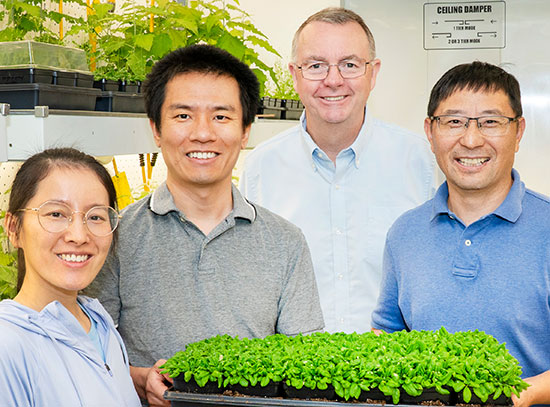
Biologists Identify Plant-specific Protein Essential for Survival
Tuesday, September 16, 2025
A newly identified protein — not found in animals or fungi — plays a key role in sterol synthesis.
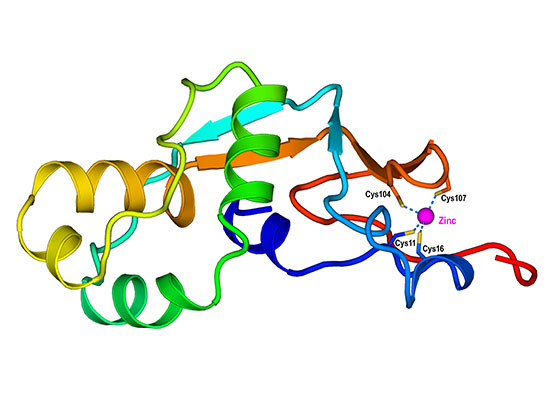
Scientists Use AI to Predict Protein Structure and Function
Monday, September 8, 2025
Researchers developed an artificial intelligence workflow that could help them grow biofuel crops on infertile soil and protect the plants from infectious diseases.
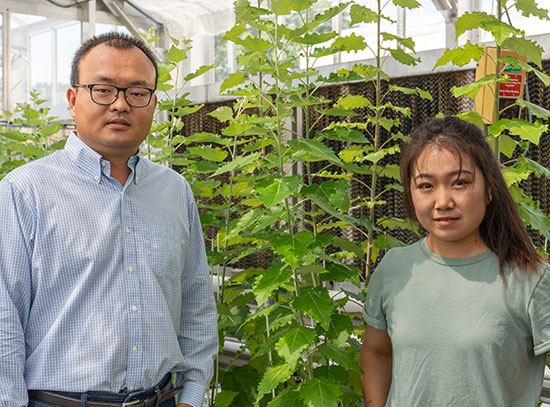
Biologists Engineer Larger, Tougher Crops for Fuel, Bioproducts
Wednesday, September 3, 2025
Disruption of plant gene boosts lignin production, growth, and immunity
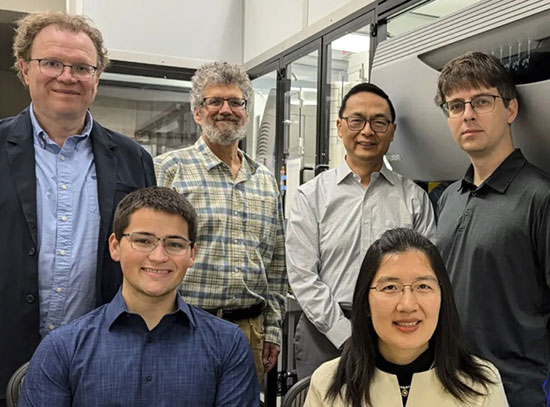
CABBI Team Deploys Robotic Lab to Revolutionize Plant Bioengineering
Monday, April 21, 2025
As the global population grows, the demand for food and energy is increasing even as extreme weather events make crops more vulnerable to stress. While traditional breeding takes years to develop more resilient crops, plant bioengineering offers a faster, more precise way to improve traits for higher yields and better stress tolerance.

Brookhaven's Top 10 Discoveries of 2024
Thursday, December 19, 2024
Brookhaven Lab celebrates a year of scientific successes, from creating the biggest bits of antimatter to improving qubits, catalysts, batteries, and more!
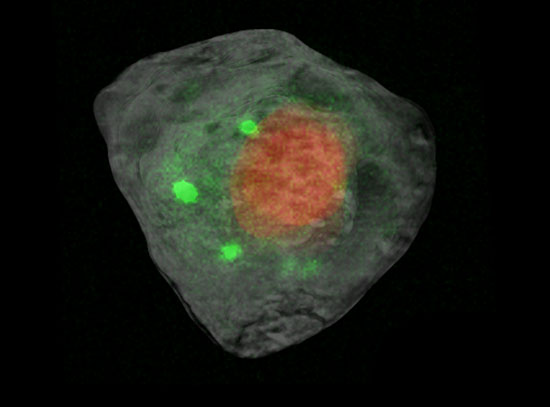
Pioneering the Cellular Frontier
Tuesday, July 23, 2024
Brookhaven researchers explore a single cell using advanced X-ray imaging techniques.
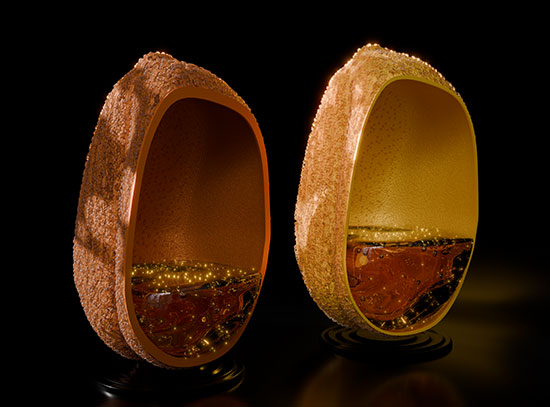
Scientists Engineer Yellow-seeded Camelina with High Oil Output
Tuesday, June 11, 2024
High-yielding version of oilseed crop could help meet the increasing demand for biofuels
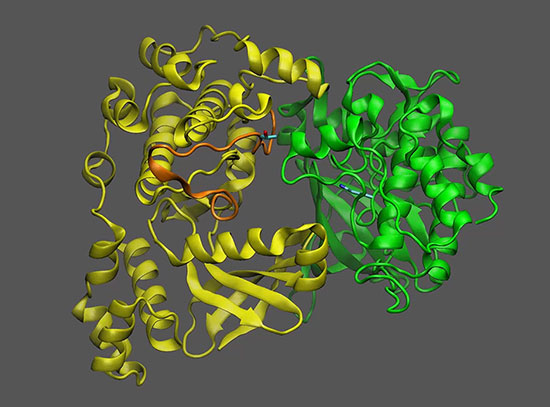
Scientists Discover Mechanism of Sugar Signaling in Plants
Friday, May 17, 2024
How a sugar-sensing protein acts as a “machine” to switch plant growth — and oil production — on and off.
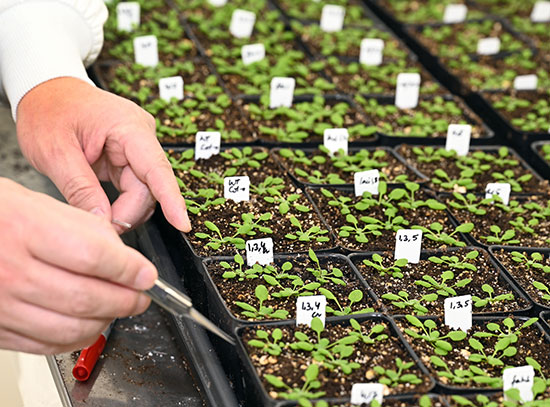
Modern Plant Enzyme Partners with Surprisingly Ancient Protein
Thursday, May 16, 2024
Study reveals that protein responsible for building a key component of modern plant cell walls first emerged in ancient species
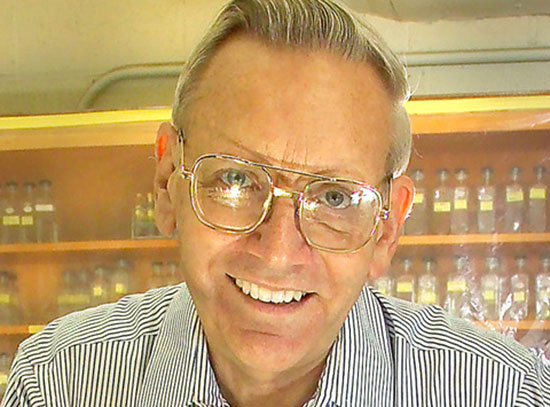
Brookhaven Lab Biophysicist F. William Studier Awarded Merkin Prize in Biomedical Technology
Tuesday, May 14, 2024
Prestigious honor recognizes development of widely used protein- and RNA-production platform
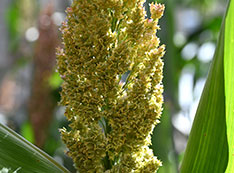
When Plants Flower: Scientists ID Genes, Mechanism in Sorghum
Thursday, March 7, 2024
Study points to genetic strategies for altering crop-plant flowering time to increase production of fuel-generating biomass.

Protecting the Protector Boosts Plant Oil Content
Thursday, February 8, 2024
Scientists demonstrate new genetic strategy for preventing breakdown of plant oils needed for biofuels and other products
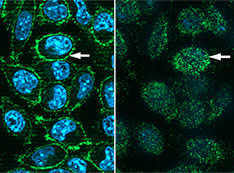
Scientists Make COVID Receptor Protein in Mouse Cells
Monday, January 22, 2024
Scientists get mouse cells to make human protein for possible use in COVID sensors or therapeutics.
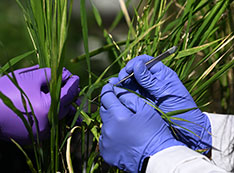
Unlocking Sugar to Generate Biofuels and Bioproducts
Thursday, October 26, 2023
Engineered enzymes could generate biomass optimized for conversion into fuel and other useful products.
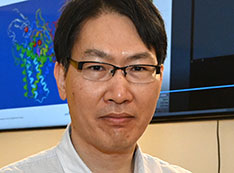
Department of Energy Announces $112.4 Million for Research to Support National Biopreparedness and Response
Thursday, September 7, 2023
Projects utilize unique capabilities and facilities of the national laboratories to address future biological crises.
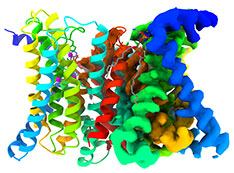
Zinc Transporter Has Built-in Self-regulating Sensor
Friday, June 9, 2023
New cryo-EM structure of a zinc-transporter protein reveals how this molecular machine functions to regulate cellular levels of zinc, an essential micronutrient.
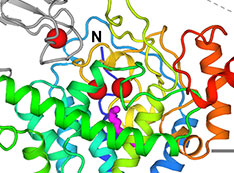
Structure of 'Oil-Eating' Enzyme Opens Door to Bioengineered Catalysts
Thursday, March 30, 2023
Atomic level details reveal how enzyme selectively breaks hydrocarbon bonds, suggesting bioengineering strategies for making useful chemicals.
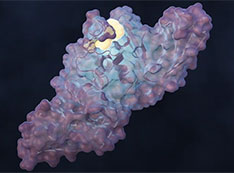
ORNL-led Team Designs Molecule to Disrupt SARS-CoV-2 Infection
Wednesday, March 29, 2023
A team of scientists led by the Department of Energy’s Oak Ridge National Laboratory designed a molecule that disrupts the infection mechanism of the SARS-CoV-2 coronavirus.
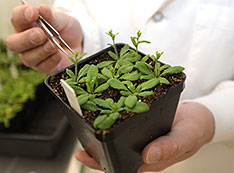
DOE Announces $590 Million To Increase Bioenergy Research
Tuesday, March 21, 2023
The U.S. Department of Energy (DOE) announced $590 million to renew its four existing Bioenergy Research Centers (BRCs).
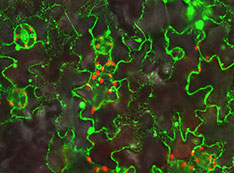
Study Identifies New Levers for Controlling Plant Biochemistry
Wednesday, January 11, 2023
Research reveals new tools for tailoring plants for range of applications, including carbon-neutral utilization of plant biomass for agro-industrial applications.
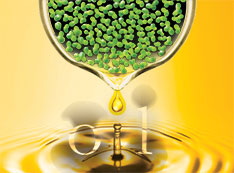
Engineering Duckweed to Produce Oil for Biofuels, Bioproducts
Tuesday, October 11, 2022
Scientists drive oil accumulation in rapidly growing aquatic plants.
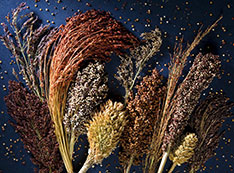
DOE Funds Pilot Study Focused on Biosecurity for Bioenergy Crops
Thursday, October 6, 2022
Research into threats from pathogens and pests would speed short-term response and spark long-term mitigation strategies.

528th Brookhaven Lecture: Metals, Life, and a Delicate Dance
Friday, August 5, 2022
Join Qun Liu of the Biology Department for this talk today, Aug. 10, at 4 p.m. on Zoom.
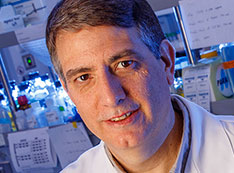
Research Shows Oilseeds' Potential for Bioproduct Creation
Wednesday, August 3, 2022
Plant science is opening up promising opportunities to create environmentally friendly bioproducts.
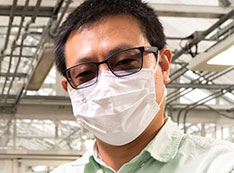
Zhai Awarded DOE Early Career Funding for Plant Enzyme Studies
Tuesday, June 7, 2022
Research aimed at understanding and increasing oil accumulation in plants could advance development of net-zero carbon fuels.
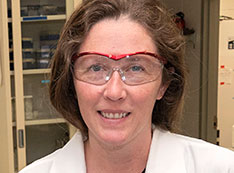
Scientists Nail Down 'Destination' for Protein That Delivers Zinc
Tuesday, May 17, 2022
Discovery reveals a key mechanism that all living things use to transport a trace element essential for survival.
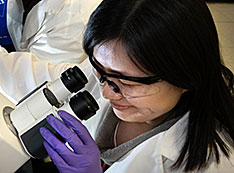
New Model for Antibacterial Mechanism: Toxic Misinformation
Friday, April 29, 2022
Discovery of an aberrant protein that kills bacterial cells could help unravel mechanism of certain antibiotics and point the way to new drugs
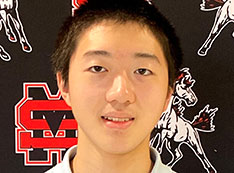
300 High School Seniors Named Nation's Top Scientists in Regeneron Science Talent Search 2022
Tuesday, January 18, 2022
$1.2 million in awards to go to students and their schools for exceptional research in science, technology, engineering, and math.
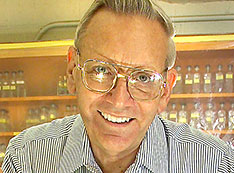
Video: Biotechnology from Brookhaven Critical for COVID Vaccines
Tuesday, January 18, 2022
Pfizer-BioNTech and Moderna used biotechnology developed at Brookhaven Lab decades ago to produce COVID-19 vaccines. John Shanklin explains.

Top-10 Areas of Amazing Science at Brookhaven Lab in 2021
Wednesday, December 29, 2021
Annual roundup of research hits showcases wide-ranging impacts on science and society
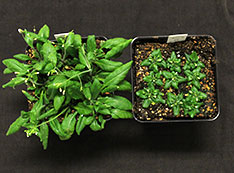
Scientists ID Sterol Essential for Oil Accumulation in Plants
Wednesday, September 22, 2021
Study provides new target for increasing oil content of plant tissues for potential applications in bioenergy, chemical engineering, and nutrition.
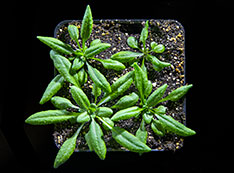
Increasing Sugar Availability for Oil Synthesis
Monday, August 30, 2021
Findings could lead to higher potential for biofuel crops.
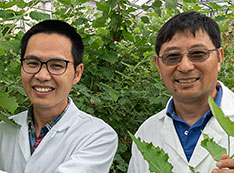
Scientists ID Enzyme for Making Key Industrial Chemical in Plants
Thursday, August 5, 2021
Tailoring levels of enzyme has many potential applications, including renewable production of p-hydroxybenzoic acid, improved biofuel production and/or timber durability, and a path for long-term carbon sequestration.
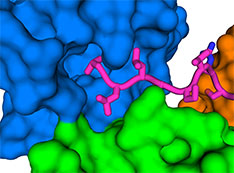
How COVID-19 Wreaks Havoc on Human Lungs
Tuesday, June 8, 2021
New structure shows how virus envelope protein hijacks cell-junction protein and promotes viral spread. Findings could speed the design of drugs to block severe effects of COVID-19.

The Science Behind the Shot: Biotech Tools Developed at Brookhaven Lab Fundamental to Making COVID-19 Vaccines
Tuesday, April 13, 2021
Enzymes and promoters based on ‘T7 expression system’ crank out copious quantities of mRNA for vaccinating people around the world.
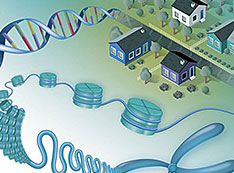
Finding Gene Neighbors Leads to New Protein Functions
Monday, April 5, 2021
Conserved genomic neighborhoods provide a new discovery tool for understanding gene function in eukaryotes.
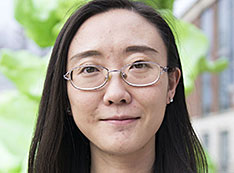
Yingqi Cai: Passion for Plants Leads to Promising Biofuel Research
Wednesday, March 24, 2021
Postdoctoral researcher aims to increase lipid production in plant vegetative tissue to provide a sustainable alternative to fossil fuels: renewable biofuels made from perennial grasses.

Green Algae Reveals One mRNA Encodes Many Proteins
Tuesday, February 23, 2021
A team of researchers has found numerous examples of two or more genes encoded on a single molecule of mRNA in green algae.
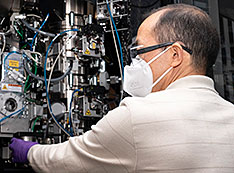
Science Begins at Brookhaven Lab's New Cryo-EM Research Facility
Thursday, January 14, 2021
Brookhaven Lab’s Laboratory for BioMolecular Structure is now open for experiments with visiting researchers using two NY State-funded cryo-electron microscopes.

Brookhaven Lab's Top-10 Stories of 2020
Wednesday, January 6, 2021
With all the remarkable changes and challenges that took place in 2020, the U.S. Department of Energy’s Brookhaven National Laboratory had a banner year in science.
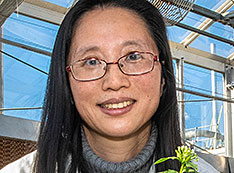
Scientists Discover Plants' Roadblock to Specialty Oil Production
Monday, January 4, 2021
Research solves longstanding problem and opens path for growing crops to produce industrially important high-value fatty acids
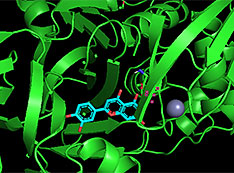
Students Identify Starting Points for Potential COVID-19 Inhibitors
Monday, December 28, 2020
Virtual drug-discovery internships provide opportunity for hands-on experience with real-world impact

Quantum X-ray Microscope Underway at Brookhaven Lab
Monday, November 23, 2020
Researchers at NSLS-II will use the quantum properties of x-rays to “ghost image” biomolecules.
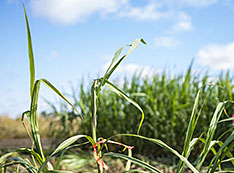
CABBI Researchers Collaborate on Oilcane Pilot Project
Thursday, October 29, 2020
Foundational biochemistry research yields harvest of crop engineered to accumulate oil for energy, bioproducts
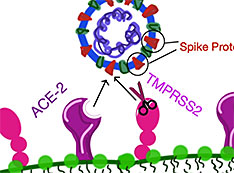
Summer Students Tackle COVID-19
Monday, August 31, 2020
Virtual summer research programs at Brookhaven Lab offer meaningful opportunities for high-school and college students to engage in a global science challenge.
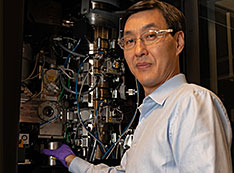
Ready to Join the Fight Against COVID-19
Wednesday, July 29, 2020
NY State-funded cryo-electron microscopes at Brookhaven Lab’s Laboratory for BioMolecular Structure are now open for COVID-19-related research
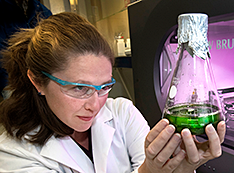
New Effort to Link Plant Genes to Functions in Bioenergy Crops
Friday, June 19, 2020
Quantitative Plant Science Initiative aims to decode functions of genes to guide breeding, engineering of sustainable bioenergy crops
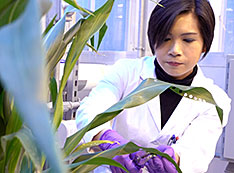
Brookhaven Biochemist Receives Prestigious Award for Plant Lipid Research
Monday, May 4, 2020
Early-career recognition for Jantana Keereetaweep’s efforts to unravel biochemical pathways that control oil synthesis in plants
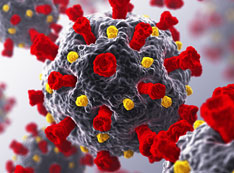
Brookhaven Lab Mobilizes Resources in Fight Against COVID-19
Monday, April 6, 2020
Brookhaven Lab scientists and staff combine expertise across disciplines and use Lab’s unique facilities to address drug development, medical supplies, information processing, and more

Top-10 Science and Technology Achievements of 2019
Monday, January 6, 2020
From building a quantum network testbed to delving deeper into proton spin, here are the Lab’s top 10 advances of the year.
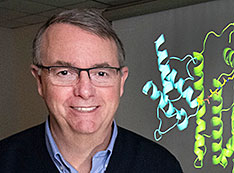
New Function for Plant Enzyme Could Lead to Green Chemistry
Monday, December 9, 2019
Discovery may inspire development of better bio-inspired industrial catalysts for one of the cornerstone chemical reactions needed to synthesize a wide array of organic molecules
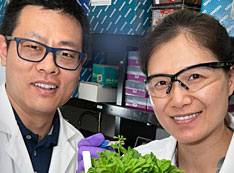
Plants' Oil-Production Accelerator Also Activates the Brakes
Thursday, June 20, 2019
Scientists discover seemingly paradoxical mechanism for regulating oil synthesis.
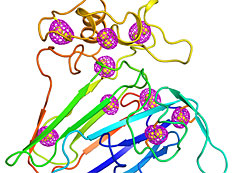
New Approach for Solving Protein Structures from Tiny Crystals
Friday, May 3, 2019
New technique opens the door for studies of countless hard-to-crystallize proteins involved in health and disease.
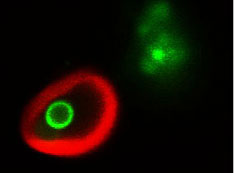
Plant Cells Eat Their Own … Membranes and Oil Droplets
Monday, April 29, 2019
Study IDs dual role for “autophagy” in building and breaking down plant oils. Manipulating the process could drive up oil accumulation in bioenergy crops.
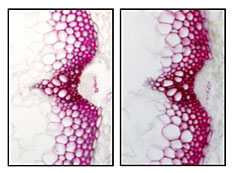
'Electron Shuttle' Protein Plays Key Role in Plant Cell-Wall Construction
Monday, April 8, 2019
Controlling the flow of electrons by targeting shuttle proteins could be a new strategy for guiding plants to make desired products.

Top 10 Discoveries of 2018
Monday, January 7, 2019
From uncovering mysteries of the universe to building better batteries, here are Brookhaven Lab’s top 10 discoveries of 2018.

Biophysicist F. William Studier Elected Fellow of the National Academy of Inventors
Tuesday, December 11, 2018
Studier developed a system for producing substantial amounts of almost any desired protein from a cloned gene.
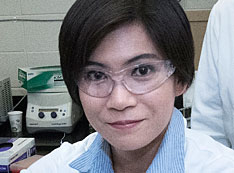
How a Molecular Signal Helps Plant Cells Decide When to Make Oil
Monday, September 24, 2018
Details of plants’ sugar-oil balancing act suggest new strategy for engineering plants to make more oil.
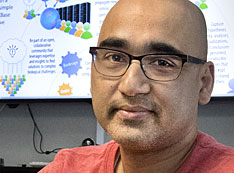
Teaming Up to Help Solve Complex Problems in Biology
Tuesday, May 22, 2018
Brookhaven Lab software engineer Arfath Pasha is helping build out the infrastructure for a web-based bioinformatics platform designed to ultimately help scientists optimize sustainable energy production and improve the environment.
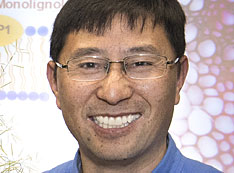
New Details of Molecular Machinery that Builds Plant Cell Wall Components
Monday, April 30, 2018
Study reveals how a membrane protein within plant cells serves as a scaffold to organize three key enzymes involved in building the cell’s exterior support.
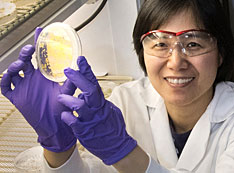
Removing the Brakes on Plant Oil Production
Monday, April 9, 2018
Understanding the biochemical details of how plants regulate oil synthesis could point to new strategies for producing renewable energy-rich chemicals

DOE Grants $10.6 Million to Produce More Biodiesel, Biojet Fuel
Tuesday, February 27, 2018
The U.S. Department of Energy has awarded the University of Illinois a $10.6 million, five-year grant to transform two of the most productive crops in America into sustainable sources of biodiesel and biojet fuel. Brookhaven Lab is a partner on the project.

2017's Top-10 Discoveries and Scientific Achievements at Brookhaven National Laboratory
Wednesday, December 27, 2017
From unraveling new details of the particle soup that filled the early universe to designing improvements for batteries, x-ray imaging, and even glass, this year’s Top-10 achievements at Brookhaven Lab span a spectrum of size scales and fields of science.
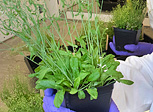
With Extra Sugar, Leaves Get Fat Too
Monday, September 25, 2017
Basic plant biochemistry and genetics help scientists tip the balance of metabolic processes to make leaves produce and store more oil. This research could help to turn plants into factories for producing biofuels and other useful chemicals.

DOE Funds Major Bioenergy Research Center at Illinois Through ISEE, IGB
Tuesday, July 18, 2017
The U.S. Department of Energy (DOE) is doubling down on energy research at the University of Illinois at Urbana-Champaign, funding a multimillion-dollar Bioenergy Research Center to provide scientific breakthroughs for a new generation of sustainable, cost-effective biofuels and bioproducts. Brookhaven Lab is a partner in this effort.
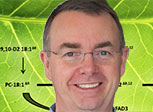
Brookhaven's John Shanklin Named a Battelle 'Inventor of the Year'
Friday, April 28, 2017
John Shanklin, a biochemist investigating the fundamental processes that underlie the production of plant oils at Brookhaven National Laboratory, is being honored as an "Inventor of the Year" by Battelle—the global science and technology organization that, together with Stony Brook University, manages Brookhaven Lab through the company Brookhaven Science Associates.

Brookhaven Lab's Asian Pacific American Association Offers Mow Shiah Lin Scholarship
Monday, April 10, 2017
Applications now being accepted for Brookhaven Lab’s Asian Pacific American Association Mow Shiah Lin Scholarship
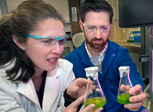
National Synchrotron Light Source II User Profiles: Crysten Blaby
Friday, March 17, 2017
Crysten Blaby is a member of the scientific staff in the Biology Department at Brookhaven National Laboratory. Many of the tools available at the National Synchrotron Light Source II will play a key role in her research
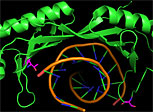
Study IDs Link Between Sugar Signaling and Regulation of Oil Production in Plants
Friday, March 17, 2017
Discovery of a previously unknown link between a protein that maintains plant sugar balance and one that turns on oil production points to new biochemical strategies for increasing oil yield from crops grown to produce biofuels and biomaterials.
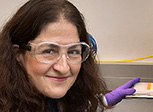
Make-up, Structure, and Function—For Proteins and Research Teams
Thursday, December 22, 2016
Proteins help antibodies fight off bacteria that make you sick, influence how you taste food, and are vital in repairing DNA damaged by chemical compounds and radiation from the sun. Meet researchers at Brookhaven Lab who are working to learn far more about the proteins that affect our lives and our world in so many ways.

Brookhaven Lab Community Bids Farewell to 2016 Summer Science Research Students
Monday, September 12, 2016
Coming from as far away as Puerto Rico, Texas, and California, Brookhaven Lab's diverse group of summer interns joined world-renowned mentors on projects in all areas of Brookhaven’s work.

The Next Generation
Monday, September 12, 2016
Select student profiles and statistics on the 2016 summer science research interns
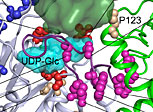
Scientists Determine Structure of Enzyme Linked with Key Cell-Signaling Protein
Monday, July 18, 2016
Atomic level snapshots show how one key enzyme modifies a protein involved in turning genes on or off inside cells, potentially pointing to new targets for anticancer drugs.
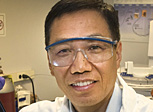
Changcheng Xu of Brookhaven Lab's Biology Department Granted Tenure
Thursday, July 7, 2016
Changcheng Xu was awarded tenure for his achievements in the field of plant lipid research, specifically in the areas of lipid trafficking between subcellular compartments and understanding the mechanisms of lipid homeostasis and oil accumulation in leaves.
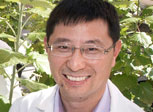
Study Shows Trees with Altered Lignin are Better for Biofuels
Tuesday, June 28, 2016
Fundamental enzyme study leads to increased access to bioenergy feedstocks and improves ethanol yield by modifying plant cell wall structures

515th Brookhaven Lecture on Wednesday, 6/29: 'Structural Biology: Studying Living Things as They Jiggle and Wiggle'
Thursday, June 23, 2016
Some proteins help antibodies fight the bacteria that make you sick and some influence how you taste the food you eat. Other proteins are vital in repairing DNA damaged by harmful chemical compounds and radiation from the sun. At National Synchrotron Light Source II, scientists are preparing for new, exciting challenges and opportunities in studying these proteins and their structure.
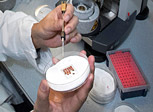
Scientists Propose "Pumpjack" Mechanism for Splitting and Copying DNA
Monday, February 8, 2016
High-resolution structural details of cells' DNA-replicating proteins offer new insight into how these molecular machines function.

Scientists Guide Gold Nanoparticles to Form "Diamond" Superlattices
Thursday, February 4, 2016
DNA scaffolds cage and coax nanoparticles into position to form crystalline arrangements that mimic the atomic structure of diamond.

John Shanklin Named Chair of Brookhaven Lab's Biology Department
Thursday, February 4, 2016
Biochemist John Shanklin has been named Chair of the Biology Department at the U.S. Department of Energy's (DOE) Brookhaven National Laboratory, effective January 1, 2016.

Meet Crysten and Ian Blaby
Friday, January 29, 2016
Brookhaven National Laboratory welcomes two new biologists, Crysten and Ian Blaby, who have been brought to the Lab to explore the many genes that play a role in a plant’s ability to harness energy and what those genes could mean for enhancing bioenergy crops.

2015's Top 10 Scientific Advances at Brookhaven National Laboratory
Tuesday, December 29, 2015
From creating the tiniest drops of primordial particle soup to devising new ways to improve batteries, catalysts, superconductors, and more, scientists at the U.S. Department of Energy's Brookhaven National Laboratory pushed the boundaries of discovery in 2015.
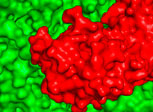
New Clues for Battling Botulism
Monday, December 7, 2015
Scientists decipher details of deadly toxin's cloaking mechanism that could guide development of new vaccines, treatments.
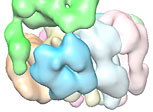
First Complete Pictures of Cells' DNA-Copying Machinery
Monday, November 2, 2015
State-of-the-art electron microscope images reveal that structure of DNA-copying protein complex differs from long-held textbook view.

Stony Brook University Student Kuan Hu Wins 2015 Mow Shiah Lin Scholarship
Wednesday, September 30, 2015
SBU Student Kuan Hu Wins Mow Lin Scholarship for his research on Mycobacterium tuberculosis.

Nobel Laureate Venki Ramakrishnan to Speak at Brookhaven Lab on Wednesday, 9/30
Thursday, September 10, 2015
Venki Ramakrishnan, who shared the 2009 Nobel Prize for Chemistry—one of seven Nobel Prizes awarded for discoveries made at Brookhaven Lab—will present a BSA Distinguished Lecture, titled "One Hundred Years of Visualizing Molecular Structure," on Wednesday, Sept. 30.
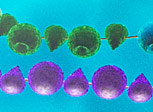
New Computer Model Could Explain how Simple Molecules Took First Step Toward Life
Tuesday, July 28, 2015
Two Brookhaven researchers developed theoretical model to explain the origins of self-replicating molecules.

Bacteria Tracked Feeding Nitrogen to Nutrient-Starved Plants
Friday, April 10, 2015
Scientists measured accelerated growth in plants colonized by bacteria that pull nitrogen from the air and release it into soil.

Brookhaven Lab's Asian Pacific American Association Offers Dr. Mow Shiah Lin Scholarship
Thursday, April 2, 2015
Applications now being accepted for Brookhaven Lab's Asian Pacific American Association Dr. Mow Shiah Lin Scholarship.
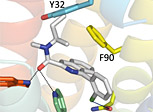
New Clues About a Brain Protein with High Affinity for Valium
Thursday, January 29, 2015
High-resolution structure could lead to design of more effective drugs with fewer side effects; biochemical assays uncover possible role in degrading destructive oxygen compounds.

500th Brookhaven Lecture on Wednesday, 12/17: 'Small Science, Big Impact: Basic Research with Bacteriophage T7'
Friday, December 12, 2014
Some of the biggest science in the world happens at the U.S. Department of Energy's Brookhaven Lab—but not all of it requires enormous machines and large teams of researchers.
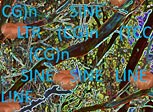
For Important Tumor-Suppressing Protein, Context is Key
Monday, November 24, 2014
Berkeley Lab scientists learn new insights into how p53 binds to the human genome.
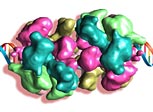
Scientists Map Key Moment in Assembly of DNA-Splitting Molecular Machine
Wednesday, October 15, 2014
Crucial steps and surprising double-ring structures are revealed during the genesis of the enzyme that divides the DNA double helix during cell replication.

Stony Brook University Student Meng Yang Wins 2014 Mow Shiah Lin Scholarship
Friday, October 3, 2014
Meng Yang, a graduate student in the Department of Chemistry at Stony Brook University (SBU), has won the tenth annual Mow Shiah Lin Scholarship.
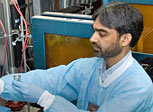
NASA Space Radiation School is Totally Radical
Monday, September 22, 2014
Students spent the summer studying the potential biological effects of deep space radiation by learning to detect DNA-driven cell changes caused by ion beams from Brookhaven Lab’s particle accelerators.

DOE 'Knowledgebase' Links Biologists, Computer Scientists to Solve Energy, Environmental Issues
Friday, August 29, 2014
With this tool from the U.S. Department of Energy (DOE), biologists don’t have to be programmers to answer big computational questions.

'Life Redesigned: The Emergence of Synthetic Biology' Lecture on Wednesday, April 30
Thursday, April 3, 2014
Biomedical engineer James Collins of Boston and Harvard universities and the Howard Hughes Medical Institute, will give a BSA Distinguished Lecture, titled "Life Redesigned: The Emergence of Synthetic Biology," at the U.S. Department of Energy's Brookhaven National Laboratory on Wednesday, April 30.

Brookhaven Lab's Asian Pacific American Association Offers Dr. Mow Shiah Lin Scholarship
Monday, March 17, 2014
Applications now being accepted for Brookhaven Lab's Asian Pacific American Association Dr. Mow Shiah Lin Scholarship.

Top-10 Brookhaven Lab Breakthroughs of 2013
Wednesday, January 15, 2014
2013 was a banner year for science at the U.S. Department of Energy's Brookhaven National Laboratory—from our contributions to Nobel Prize-winning research to new insights into catalysts, superconductors, and other materials key to advancing energy-efficient technologies.

Scientists Identify Key Genes for Increasing Oil Content in Plant Leaves
Friday, October 18, 2013
Enhancing expression of key genes required for oil production and accumulation in plant leaves resulted in vastly increased oil content—a finding that could have important implications for increasing the energy content of plant-based foods and renewable biofuel feedstocks.

Stony Brook University Student Jo-Ann Jee Wins Mow Shiah Lin Scholarship
Thursday, October 3, 2013
Jo-Ann Jee, a graduate student at Stony Brook University (SBU) has won the ninth annual Mow Shiah Lin Scholarship.

Elevated Levels of Copper in Amyloid Plaques Associated with Neurodegeneration in Mouse Models of Alzheimer's Disease
Thursday, August 22, 2013
Findings published in Biomedical Spectroscopy and Imaging suggest excess copper may be neurotoxic or at least indicative of early abnormality.

Biosciences Seminar Room Dedicated to John Dunn
Tuesday, August 6, 2013
Employees, past and present, together with family and friends of the Biosciences Department, gathered last week to dedicate their main conference room to their colleague, the late John Dunn.

Key Step in Molecular 'Dance' that Duplicates DNA Deciphered
Sunday, July 14, 2013
Scientists have captured new details of the biochemical interactions necessary for cell division—molecular images showing how the enzyme that unwinds the DNA double helix gets drawn to and wrapped around its target.

Brookhaven Lab's Asian Pacific American Association Offers Dr. Mow Shiah Lin Scholarship
Monday, March 18, 2013
Applications are now being accepted for the ninth Dr. Mow Shiah Lin Scholarship sponsored by the Asian Pacific American Association (APAA) at BNL.

Scientists Turn Toxic By-Product Into Biofuel Booster
Monday, February 4, 2013
Scientists studying an enzyme that naturally produces alkanes have devised a strategy to keep the reaction going, renewing interest in using the enzyme in bacteria, algae, or plants to produce biofuels that need no further processing.

David Schlyer Named Chair of Brookhaven Lab's Biosciences Department
Friday, January 11, 2013
David Schlyer, a senior chemist who specializes in medical imaging and radiotracer chemistry, was named Chair of the Biosciences Department at BNL, effective December 1, 2012.

Biologists Describe Details of New Mechanism for Molecular Interactions
Wednesday, October 10, 2012
“Molecular sled” carries viral enzyme along DNA to find and interact with target proteins. The findings suggest this new mechanism of enzyme-protein interaction may be universal.

Computational Model IDs Potential Pathways to Improve Plant Oil Production
Monday, October 8, 2012
Simulated seeds help scientists explore how plants “balance the books” between oil and protein production.

Stony Brook University Student Yixiong Yang Wins Mow Shiah Lin Scholarship
Monday, October 1, 2012
Yixiong Yang, a graduate student at Stony Brook University has won the eighth annual Mow Shiah Lin Scholarship.

In Memoriam, John Dunn
Thursday, September 13, 2012
John Dunn, a senior scientist in the Biology Department, died on July 13, 2012. He was 68.

A New Approach for Solving Protein Structures
Wednesday, September 5, 2012
Recently, scientists from NSLS, the New York Structural Biology Center and Columbia University discovered a new method to determine molecular structures that would have been difficult or impossible to solve otherwise.

Scientists Create Low-Lignin Plants with Improved Potential for Biofuel Production
Tuesday, July 31, 2012
Engineered enzyme alters cell wall composition in ways that could make it easier to convert plant biomass into biofuels.

Sarah Ackerman Explores How Cells Fare in Space
Monday, July 30, 2012
As a summer intern at Brookhaven National Laboratory, Sarah Ackerman explores how defective cells might actually be more resistant to ionizing radiation.

479th Brookhaven Lecture, 6/20
Wednesday, June 20, 2012
Join Jörg Schwender of the Biology Department for the 479th Brookhaven Lecture in Berkner Hall today, June 20, at 4 p.m. Schwender will discuss how scientists at Brookhaven are using advanced computational models as they explore metabolic networks in plants to determine how these networks affect oil and biomass production.

Just How Does a Garden Grow?
Wednesday, June 20, 2012
Jörg Schwender, a BNL biochemist, discusses his work developing computational models to study plants’ pathways of biochemical reactions where nutrients are converted into energy needed for growth and survival.

Carbon is Key for Getting Algae to Pump Out More Oil
Monday, June 18, 2012
Scientists find that ramping up the overall metabolism of algae by feeding them more carbon increases oil production as the organisms continue to grow. The findings may point to new ways to turn photosynthetic green algae into tiny “green factories” for producing raw materials for alternative fuels.

Scientists ID Mechanism for Regulating Plant Oil Production
Monday, June 4, 2012
Scientists have identified key elements in the biochemical mechanism plants use to limit the production of fatty acids, which might help them find ways to increase the production of plant oils as a renewable resource for biofuels and industrial processes.

A.J. Francis Named Scientist Emeritus
Tuesday, March 27, 2012
Arokiasamy J. Francis of the Environmental Sciences Department has been named Scientist Emeritus for his distinguished contributions to microbiology and remediation. Francis retired in November 2011 after a 36-year career at BNL.

Study Reveals How Protein Machinery Binds and Wraps DNA to Start Replication
Tuesday, March 6, 2012
Scientists have deciphered molecular-level details of the complex choreography by which intricate cellular proteins recognize and bind to DNA to start the DNA replication process. The research may point to ways to block unwanted cell division.

Meet Chang-Jun Liu and Paul Sorensen
Thursday, February 9, 2012
Brookhaven Science Associates (BSA) has granted tenure to 10 BNL scientists. The newly tenured scientists will be featured in the coming weeks. Today, find out about the contributions of the Biology Department’s Chang-Jun Liu and the Physics Department’s Paul Sorensen.

Study Offers Insight into Delicate Biochemical Balance Required for Plant Growth
Friday, January 13, 2012
Findings have implications for producing sustainable biomass, biofuels, and food-processing agents.

Multimodal Thinking – Medical Imaging with Antimatter and Nuclear Spins
Wednesday, December 14, 2011
New multi-modality imaging — which provides both anatomical and functional information from one single scan — is proving to be an invaluable tool for research in areas ranging from cancer in humans to water transport in plants. Today, join David Schlyer for the 473rd Brookhaven Lecture, titled “Multimodal Thinking — Medical Imaging with Antimatter and Nuclear Spins.”

First Analysis of Tumor-Suppressor Interactions with Whole Genome in Normal Human Cells Reveals Key Differences with Cancer Cells
Wednesday, November 30, 2011
Findings point at a link between tumor suppressor protein functions and human epigenome.

Brookhaven Lab Scientists Help Siemens Competition Regional Winners With Their Research
Wednesday, November 16, 2011
Alexandra McHale, a senior at Smithtown High School East, and Ariella and Eliana Applebaum, twin sisters who are juniors at Ma’ayanot Yeshiva High School for Girls in Teaneck, New Jersey, credit BNL with providing them with the crucial expertise and facilities needed to become regional winners in the 2011-2012 Siemens Competition.

Bioengineer Stephen Quake to Speak at Brookhaven Lab on 'Precision Measurements in Biology,' November 30
Monday, November 7, 2011
Stephen Quake, Professor of Bioengineering, Physics and Applied Physics at Stanford University, will give a BSA Distinguished Lecture titled "Precision Measurements in Biology" in Berkner Hall at BNL on Wednesday, November 30, at 4 p.m.

Scientists Target Bacteria “Quorum Sensing” as a Route to New Antibacterial Therapies
Wednesday, October 26, 2011
By studying how to inhibit quorum sensing, the way bacteria communicate and coordinate collective behaviors, scientists may be able create antibacterial pharmaceuticals for a variety of ailments.

Talk at Brookhaven Lab, November 10: 'A Step Closer to Understanding Alzheimer's Disease'
Thursday, October 20, 2011
Ya Ha, an associate professor of pharmacology at the Yale University School of Medicine, will give a talk titled “A Step Closer to Understanding Alzheimer’s Disease” at the Laboratory’s Berkner Hall on Thursday, November 10, at 4 p.m. Sponsored by Brookhaven Women in Science, the public talk is free, and no registration is required.

Stony Brook University Student Zhixun Dou Wins Dr. Mow Shiah Lin Scholarship
Thursday, October 13, 2011
Zhixun Dou, a graduate student in Stony Brook University, has won the seventh annual Dr. Mow Shiah Lin Scholarship sponsored by Brookhaven Lab's Asian Pacific American Association.

Scientists Solve Long-Standing Plant Biochemistry Mystery
Monday, September 19, 2011
Single amino acid exerts “remote control” over double bond placement by desaturase enzymes in plant fatty acids. This research may lead to new ways to engineer plant oils as a renewable replacement for petrochemicals.

Carl Anderson Named Senior Scientist Emeritus
Thursday, August 25, 2011
Carl Anderson, former chair of the Biology Department, has been named Senior Scientist Emeritus for his distinguished contributions to microbiology. Anderson retired in April 22, 2011, after a 36-year career at BNL.

Modeling Plant Metabolism to Optimize Oil Production
Tuesday, July 26, 2011
A computational model for analyzing the metabolic processes in rapeseed plants — particularly those related to the production of oils — may help scientists optimize the production of plant oils that have widespread potential as renewable resources for fuel and industrial chemicals.

Scientists to assemble 'knowledgebase' on plants, microbes, to aid US biofuel, environment efforts
Monday, July 18, 2011
New program to support Department of Energy goals such as improved biofuel production, carbon sequestration, and environmental cleanup.

Integrated ‘Knowledgebase’ on Plants and Microbes to Aid Energy Research
Monday, July 18, 2011
New program to support Department of Energy goals such as improved biofuel production, carbon sequestration, and environmental cleanup.

Using Sound to Mount Microcrystals for X-ray Diffraction
Thursday, July 7, 2011
Brookhaven researchers are using high-frequency sound waves along with extremely bright x-rays to look at the atomic structures of complex biological molecules.

Bacterial Protein Caught in the Act of Secreting Sticky Appendages
Wednesday, June 1, 2011
Atomic-level structural images and mechanism suggest new targets for antibacterial drugs.

Brookhaven Lab's Asian Pacific American Association Offers Dr. Mow Shiah Lin Scholarship
Thursday, April 21, 2011
Applications are now being accepted for the seventh Dr. Mow Shiah Lin Scholarship sponsored by the Asian Pacific American Association (APAA) at BNL. The annual $1,000 scholarship was initiated to honor the late Brookhaven Lab scientist for whom it is named.

Nobel Laureate Thomas A. Steitz to Speak at Brookhaven Lab on the Ribosome and New Antibiotics, May 23
Wednesday, April 20, 2011
Nobel Laureate Thomas A. Steitz of Yale University and the Howard Hughes Medical Institute, will give a BSA Distinguished Lecture, titled “From the Structure and Function of the Ribosome to New Antibiotics,” on Monday, May 23, at 4 p.m. in Berkner Hall at BNL.

F. William Studier: Basic Research Leads to Most Successful BNL Technology
Thursday, April 7, 2011
With colleagues in the Biology Department, F. William Studier developed Brookhaven Lab's most successful technology: the T7 protein expression system.

Genetic Makeup and Duration of Abuse Reduce the Brain's Neurons in Drug Addiction
Monday, March 7, 2011
A study conducted at BNL demonstrated that drug addicted individuals who have a certain genetic makeup have lower gray matter density — and therefore fewer neurons — in areas of the brain that are essential for decision-making, self-control and learning and memory.

Princeton University Biologist Bonnie Bassler to Give a Talk at Brookhaven Lab on Cell-to-Cell Communication in Bacteria, March 24
Friday, February 25, 2011
Bonnie Bassler, Howard Hughes Medical Institute investigator and Squibb Professor of Molecular Biology at Princeton University, will give a talk, titled “Tiny Conspiracies: Cell-to-Cell Communication in Bacteria,” at BNL on Thursday, March 24, at 4 p.m. in Berkner Hall. Sponsored by Brookhaven Women in Science, the talk is free, and no pre-registration is required.

Harvard Chemist Xiaoliang Sunney Xie to Speak at Brookhaven Lab on 'Life at the Single Molecule Level,' March 4
Friday, February 4, 2011
Xiaoliang Sunney Xie, Mallinckrodt Professor of Chemistry and Chemical Biology at Harvard University, will give a BSA Distinguished Lecture titled “Life at the Single Molecule Level,” at BNL on Friday, March 4, at 4 p.m. in Berkner Hall. The lecture is free and open to the public.

The Village Beacon Record Honors BNL Scientists
Thursday, January 27, 2011
The Village Beacon Record, a local weekly newspaper, honored Oleg Gang, Center for Functional Nanomaterials, and Huilin Li, Biology Department, as its 2010 Men of the Year in Science and in Health/Medicine, respectively.

Brookhaven Lab’s Top 5 Scientific Discoveries of 2010
Friday, January 14, 2011
From the creation of 4-trillion-degree matter that existed just microseconds after the Big Bang to new nanocatalysts that can make fuel-cell cars more economical, BNL made a series of stunning discoveries in 2010.

Scientists Unravel More Details of Plant Cell-Wall Construction
Monday, December 13, 2010
Understanding how lignin building blocks are transported could break down barriers to biofuel production.

Uptake Protein Acts as Zinc’s Doorway to the Cell
Monday, November 22, 2010
Discovery of mechanism sheds light on how zinc — essential to growth of all living organisms — enters cells

Engineered Plants Make Potential Precursor to Raw Material for Plastics
Monday, November 8, 2010
Engineered oils could be sustainable “green” replacement for petrochemical-based production

Detective Novel Uses NSLS to Help Solve a Crime
Thursday, November 4, 2010
Novelist Archer Mayor includes Brookhaven National Laboratory in his latest whodunit.

PET Scans Reveal Estrogen-Producing Hotspots in Human Brain
Monday, November 1, 2010
New radiotracer application reveals features unique to humans; may advance understanding of estrogen-related diseases

Protein Shows How Plants Keep Their Mouths Shut
Wednesday, October 27, 2010
Using intense beams of x-rays at Brookhaven Lab, researchers have uncovered the atomic structure of a protein responsible for closing the “mouths,” or stomata, of plants.

462nd Brookhaven Lecture Featuring Chang-Jun Liu
Thursday, October 21, 2010
Tailoring Biomass to Biofuels and Bioproducts: Tailoring Lignocelulosic Feedstocks for a Sustainable Energy Future

Key Difference in How TB Bacteria Degrade Doomed Proteins
Sunday, October 17, 2010
Scientists at BNL and Stony Brook University have discovered a key difference in the way human cells and Mycobacterium tuberculosis bacteria, which cause TB, deliver unwanted proteins — marked with a “kiss of death” sequence — to their respective cellular recycling factories.

Science Editor-in-Chief Bruce Alberts to Give Two Lectures at Brookhaven Lab
Friday, August 13, 2010
Bruce Alberts, a prominent biochemist who is the Editor-in-Chief of the international weekly journal Science, will give two George B. Pegram Lectures at the U.S. Department of Energy’s Brookhaven National Laboratory.

Reinhold Mann Named Brookhaven Lab's Associate Laboratory Director for Environment and Life Sciences
Thursday, July 1, 2010
Reinhold Mann, former Senior Vice President for Research and Development at Battelle Science and Technology Malaysia, has been named Associate Laboratory Director for Environment and Life Sciences at Brookhaven National Laboratory, effective July 1.

Reinhold Mann Named Brookhaven Lab's Associate Laboratory Director for Environment and Life Sciences
Friday, June 18, 2010
Reinhold Mann has been named Associate Laboratory Director for Brookhaven Lab’s Environment and Life Sciences Directorate.

Scientists Decipher Structure of Nature’s ‘Light Switch’
Monday, May 31, 2010
Molecular details of a light-sensing structure will help scientists understand how plants respond to light

Scientists ID Bacterial Genes that Improve Plant Growth
Thursday, May 13, 2010
Genes of bacteria living with poplar tree roots help explain a plant-microbe symbiotic success story that could be used to improve agriculture and biofuel production.

New Details of Tuberculosis Protein-Cleaving Machinery Revealed
Tuesday, May 11, 2010
New details of a structure that helps tuberculosis (TB) bacteria survive could assist researchers working to develop anti-TB drugs.

Getting More From Less: Correlated Single-Crystal Spectroscopy and X-ray Crystallography at the NSLS
Wednesday, April 21, 2010
On Wednesday, April 21, join Allen Orville of the Biology Department for the 456th Brookhaven Lecture, titled “Getting More From Less: Correlated Single-Crystal Spectroscopy and X-ray Crystallography at the NSLS.”

Scientists Get Funding to Design Anti-Botulism Drugs
Wednesday, March 3, 2010
U.S. Department of Energy’s Brookhaven National Laboratory and Stony Brook University’s Institute of Chemical Biology and Drug Discovery (ICB&DD) scientists were selected to receive up to $1.4 million in research funds from the Department of Defense to develop anti-botulism drugs.

Making New Enzymes to Engineer Plants for Biofuel Production
Monday, December 21, 2009
Brookhaven scientists have created a new enzyme with the potential to interfere with a key cell-wall component in plants, possibly leading to plants that are easier to “digest” and convert to biofuels.

Grooving Down the Helix
Thursday, December 3, 2009
A team of scientists has made a major step in understanding how molecules locate the genetic information in DNA that is necessary to carry out important biological processes.

John Sutherland Honored with Emeritus Title
Friday, November 20, 2009
John Sutherland, Biology Department, has been honored with the title Senior Biophysicist Emeritus.

CSHL team solves structure of NMDA receptor unit that could be drug target for neurological diseases
Friday, November 13, 2009
A team of scientists at Cold Spring Harbor Laboratory (CSHL) reports their success in solving the molecular structure of a key portion of a cellular receptor implicated in Alzheimer's, Parkinson's, and other serious illnesses. Assistant Professor Hiro Furukawa, Ph.D., and colleagues at CSHL, in cooperation with the National Synchrotron Light Source at Brookhaven National Laboratory, obtained crystal structures for one of several "subunits" of the NMDA receptor.

Genomes of Two Popular Research Strains of E. coli Sequenced
Tuesday, October 20, 2009
An international team of researchers from the United States, Korea, and France has sequenced and analyzed the genomes of two important laboratory strains of E. coli bacteria, one used to study evolution and the other to produce proteins for basic research or practical applications.

Popping the Cork on Biofuel Agriculture
Monday, October 19, 2009
BNL scientists have identified an enzyme that helps control water and nutrient transport in plants. Manipulating this enzyme could lead to easier agricultural production of biofuels.

Richard Setlow Honored at Celebration Symposium
Wednesday, October 7, 2009
Colleagues, friends and family honored Richard Setlow, Senior Biophysicist Emeritus, at a “celebration symposium” sponsored by the Biology Department on September 23, the date he received his 35th BNL Anniversary Award.

Inhibitors of Important Tuberculosis Survival Mechanism Identified
Wednesday, September 16, 2009
Scientists identify compounds that can disable an important survival mechanism in tuberculosis bacteria. This research could lead to the design of new anti-TB drugs.

High-Res View of Zinc Transport Protein
Sunday, September 13, 2009
New, improved-resolution views of a zinc transporter protein deciphered at Brookhaven Lab provide not just a structure but also a suggested mechanism for how cells sense and regulate zinc.

NIH Funding Renewed for Case Center for Synchrotron Biosciences
Thursday, September 3, 2009
The National Institutes of Health has awarded a five-year, $4 million grant to a bioscience consortium that operates five beamlines at the NSLS.

Chemists Reach from the Molecular to the Real World with Creation of 3-D DNA Crystals
Thursday, September 3, 2009
Chemists have created three-dimensional DNA structures, a breakthrough bridging the molecular world to the world where we live. The work, reported in the latest issue of the journal Nature, also has a range of potential industrial and pharmaceutical applications, such as the creation of nanoelectronic components and the organization of drug receptor targets to enable illumination of their 3D structures.

Tiny, Powerful Beams Will Enable New Science: Workshop Makes Case for Micro-Beams
Tuesday, September 1, 2009
International workshop participants at BNL conclude that one-micron or sub-micron beams — for example, at NSLS-II — could greatly advance structural biology research, particularly in macromolecular crystallography.

Trapped! Scientists Immobilize Bacteria in Fibrous Hydrogel
Monday, August 3, 2009
Scientists at Brookhaven Lab and Stony Brook University have devised a way to encapsulate bacteria in a synthetic polymer hydrogel.

BNLers Honored at Lab Recognition Ceremony
Monday, July 20, 2009
At the annual Employee Recognition Ceremony held June 22 in Berkner Hall, 13 BNLers were honored with the Lab’s highest awards: five received the Brookhaven Award, five, the Engineering & Computing Award, and two, the Science & Technology Award.

How Botulism Paralyzes Nerve Cells: New Details Revealed
Sunday, June 21, 2009
New structures of a botulism toxin interacting with a mimic of the nerve-cell protein it destroys suggest new ways to block this often-fatal interaction.

Plant Microbe Shares Features with Drug-Resistant Pathogen
Tuesday, June 16, 2009
An international team of scientists has discovered extensive similarities between a strain of bacteria commonly associated with plants and one increasingly linked to opportunistic infections in hospital patients. The findings suggest caution in the use of the plant-associated strain for a range of biotech applications.

Students Join Brookhaven Lab's NASA Space Radiation Summer School
Monday, June 1, 2009
Students and scientists from laboratories and universities throughout the world have travelled to New York to participate in the sixth annual NASA Space Radiation Summer School at Brookhaven National Lab. The group will study the risks astronauts may face during future long-term space flights.

Details of Bacterial 'Injection' System Revealed
Sunday, April 26, 2009
New details of the composition and structure of a needlelike protein complex on the surface of certain bacteria may help scientists develop new strategies to thwart infection.

Using Plants To Help the Environment
Thursday, April 23, 2009
On April 16, three scientists from the Biology Department — Daniel (Niels) van der Lelie, Safiyh Taghavi, and Lee Newman — met at BNL with Guy Lanza of the University of Massachusetts, Charles (Mike) Reynolds of the Army Cold Regions Research & Engineering Laboratory, and Jason White of the Connecticut Agricultural Research Station to start the Northeast Phytotechnology Research Consortium.

New Radiotracers on the Horizon
Tuesday, April 21, 2009
The radiotracer chemistry group at Brookhaven National Laboratory has developed a method to directly label carbamate-containing compounds with [11C]-carbon dioxide.

Plant Gene Mapping May Lead to Better Biofuel Production
Friday, April 10, 2009
By creating a "family tree" of genes expressed in one form of woody plant and a less woody, herbaceous species, scientists at Brookhaven have uncovered clues that may help them engineer plants more amenable to biofuel production.

DNA-Based Assembly Line for Precision Nano-Cluster Construction
Sunday, March 29, 2009
Building on the idea of using DNA to link up nanoparticles — particles measuring mere billionths of a meter — scientists at Brookhaven Lab have designed a molecular assembly line for predictable, high-precision nano-construction.

Nobel Laureate Paul Nurse to Give Two Lectures at Brookhaven Lab, March 18 — 'Controlling the Cell Cycle' and 'The Great Ideas of Biology'
Wednesday, February 18, 2009
Nobel Laureate Paul Nurse, President of Rockefeller University, will give two George B. Pegram Lectures on Wednesday, March 18, at 11 a.m. and 4 p.m. in Berkner Hall at Brookhaven Lab. Inaugurated in 1959, the Pegram lectures bring distinguished scholars to the Laboratory to speak on topics of both scientific and general interest.

Scientists Identify Bacteria That Increase Plant Growth
Monday, January 26, 2009
Through work originally designed to remove contaminants from soil, scientists at Brookhaven Lab and their Belgium colleagues at Hasselt University have identified plant-associated microbes that can improve plant growth on marginal land.

Scientists Reveal Structure of New Botulism Nerve Toxin Subtype
Monday, December 22, 2008
Scientists at Brookhaven Lab have determined the atomic-level structure of a third subtype of botulinum neurotoxin — a deadly toxin produced by certain bacteria that causes the disease botulism, and is also used in cosmetic and therapeutic applications such as reducing wrinkles and calming a hyperactive bladder.

Molecular 'Snapshots' Capture Infectious Pili Formation
Thursday, May 15, 2008
Using two sophisticated imaging techniques, scientists at Brookhaven Lab and collaborators have captured molecular-level "snapshots" of the cellular machinery that assembles hairlike projections on certain bacterial cells.

Scientists Determine Drug Target for the Most Potent Botulinum Neurotoxin
Tuesday, April 29, 2008
Botulinum neurotoxin - responsible for the deadly food poisoning disease botulism and for the beneficial effects of smoothing out facial wrinkles - can also be used as a dreaded biological weapon. When ingested or inhaled, less than a billionth of an ounce can cause muscle paralysis and eventual death.

Studies Suggest New Targets for Tuberculosis Treatments
Monday, March 6, 2006
With the hope of designing more effective treatments for tuberculosis (TB), scientists Brookhaven and collaborating institutions have published the first detailed reports on the biochemistry and structure of a protein-cleaving complex that is essential to the TB bacterium's survival. The research is published in two papers in the March 2006 issue of Molecular Microbiology.

Landmark Progress in Understanding Ribosome Structure — Research Done at Brookhaven Lab's Light Source
Wednesday, August 25, 1999
Two reports in the August 26 issue of the scientific journal Nature describe landmark progress in understanding the structure of the ribosome. Both Nature reports are based on data generated by a scientific technique called x-ray crystallography, performed at the National Synchrotron Light Source.




